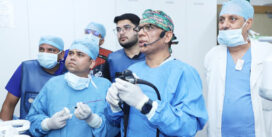Manufacturers should develop their own innovative technologies, says Shri Anil Agrawal, Additional Secretary, DPIIT, at PHDCCI’s Programme on Expectations from the New Industrial Policy of India
The industrial landscape’s regulation has shifted dramatically in recent years, stated Shri Anil Agrawal, Additional Secretary, DPIIT, Ministry of Commerce and Industry, Government of India, as the Chief Guest at Programme on ‘Expectations from the New Industrial Policy of India’, organized by the PHD Chamber of Commerce and Industry (PHDCCI). He explained that in 1951, we said that no industry could grow and that every industry needed a licence to come and produce. With liberalization, certain policies changed in 1991, but the industrial act remained as it is, and that is one of the major areas that we are looking at.
Shri Agrawal informed that in the last 6-7 years, the government is increasingly trying to facilitate investments. Nobody heard of the term ‘investment promotions’ before, today we have developed an entire organization for investment promotion. Our Hon’ble Prime Minister, Shri Narendra Modi, has been continuously saying that you cannot distribute poverty, you need to distribute wealth, so we respect wealth creators. There is a change in the mindset that we must see and appreciate.
The Additional Secretary, DPIIT also said that the nation could survive the COVID-19 pandemic because of the partnership between the industry and the society, which also includes the partnership between the scientist and the medicinal professionals. From zero, we are now the 3rd largest startup ecosystem. He added that in order to sustain, manufacturers should develop their own technology and should be innovative. They should not rely on the government or any other source for the technology.
Guest of Honour at the Programme, Ms. Rupa Dutta, Principal Adviser, DPIIT, Ministry of Commerce and Industry, Government of India, said that there were a few pandemic mega trends that were already driving the ship – emerging technologies, sunrise sectors, climate change, and the inclusion of environmental sustainability and reconfiguration of globalisation where COVID-19 acted as an accelerator. She added that a new window of opportunity has opened up with new destinations emerging as manufacturing locations of choice and that India is making efforts to capitalize on this opportunity.
The Principal Adviser, DPIIT, stated that the government is looking at an enabling framework that can bring all sectors together to address challenges and figure out how to move forward, with manufacturing playing a key role. They are focussing on a few areas, which include circular sustainable economy, the need to improve the competitiveness of domestic industry, moving up the global value chain, skill development, and promotion of emerging technologies.
Dr. Sabyasachi Kar, RBI Chair, Professor Institute of Economic Growth, New Delhi, stated that we are hopefully coming out of the pandemic and we want to make sure that this is an opportunity for us to build a better and stronger economy. He said that there was a need to look at two sets of things – what our legacy economy or traditional issues were in terms of growth of industry and the new opportunities.
He also said that it is becoming increasingly clear that global supply chains have been efficient, but not resilient. He explained that you will get the cheapest input if you rely on a single global supply chain that is based on a single country, but if that country fails, you will have nothing. As a result, there is a growing recognition that resilience is important in a world filled with shocks, and this presents an opportunity for countries like India to provide an alternative to global supply chains, he added.
Dr. Nagesh Kumar, Director, Institute for Studies in Industrial Development, New Delhi, stated that the potential of the country in the manufacturing sector is limitless, but the 16% GDP attributed to it is not really doing justice to our industries. However, the success of startups in the past few years, despite the pandemic, gives hope and encourages us to train our vision high. India should strengthen its export-oriented industrialization, deepen its electronic and digital ecosystem and exploit the green industrialization opportunities. It should also take useful lessons from East Asian countries in using strategic interventions and other facilitations for promoting industrialization.
Shri Sandeep Aggarwal, Chair, Industry Affairs Committee, PHDCCI , while giving the welcome remarks, stated that the programme is timely because this is what the government has been finalising and working on. He said that MSME is facing issues related to Bank Guarantee and working capital. He said that price hikes in copper, steel, aluminium etc. is an area of concern and should be taken care of by the government. He said that import duty should be reduced so that misrepresentation can be avoided.
Shri Dushyant Thakor, Senior Vice President, Invest India, New Delhi also graced the programme with his presence and shared his expert viewpoints. Shri Vishwa Nath, Co-Chair, Industry Affairs Committee, PHDCCI, provided the concluding remarks and vote of thanks. Dr S P Sharma, Chief Economist | DSG, PHDCCI, gave the opening remarks and moderated the Programme.
The Event was sponsored by PHDCCI’s Annual Sponsors – Multani Pharmaceuticals Ltd; Star Wire; PG Industry; Uflex Ltd; DLF Ltd; Continental Carriers Pvt Ltd; Belair Travel & Cargo Pvt Ltd; Radico Khaitan Ltd; Jindal Steel & Power; MMG Group; Paramount Communications; Superior Industries Limited; JK Tyre & Industries Ltd; SMC Investments and Advisors Ltd; Crystal Crop Protection Ltd; Sagar Group of Industries; Samsung India Electronics; Comtech Interio; R E Rogers; AYUSH Herbs Private Ltd; Apeejay Stya Group; DCM Shriram; EaseMyTrip; Blossom Kochhar Beauty Products Pvt Ltd; Oswal Greentech; Trident Group; MV Cotspin Ltd; Synergy Environics Ltd; Ajit Industries Pvt Ltd; P S BEDI & Co.; Indian Farmer &Fertilizers Corporation Ltd; Jindal Steel; Hindware Sanitary; Modern Automobiles; Livit Ltd; Central Coalfields Ltd ; Axa Parenterals; Bhagwati Plastic and Pipes Industries; J K Insurance Brokers Ltd; DD Pharmaceutical Ltd.


